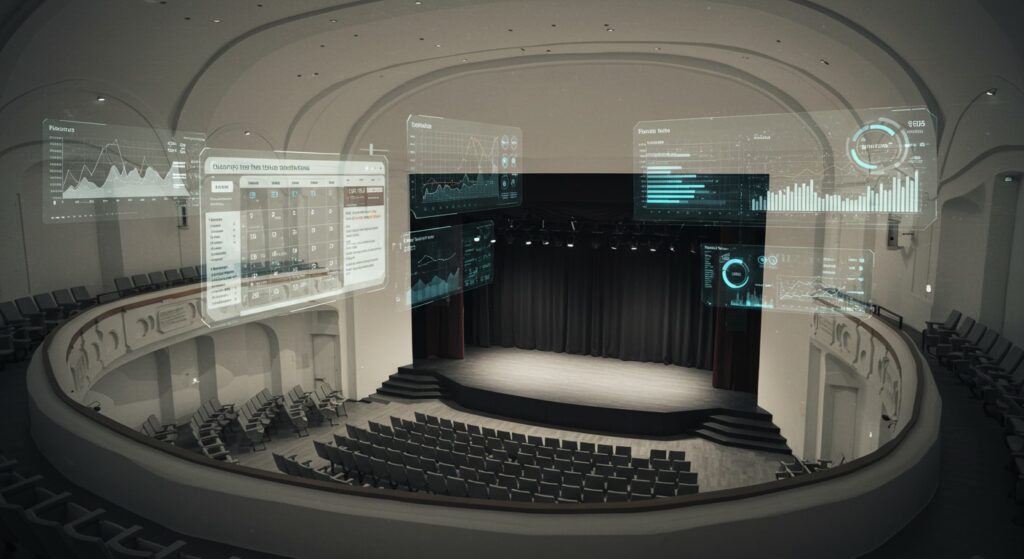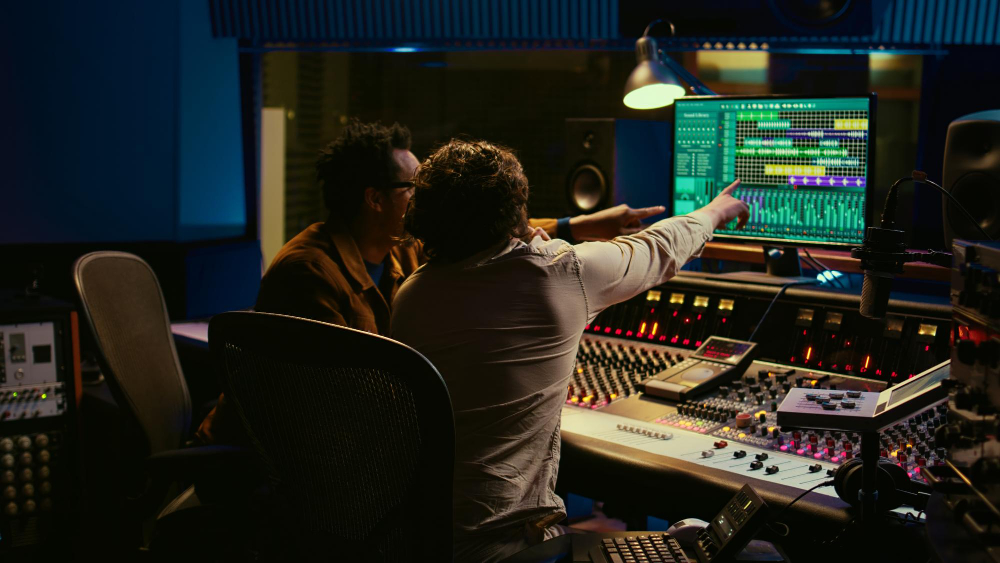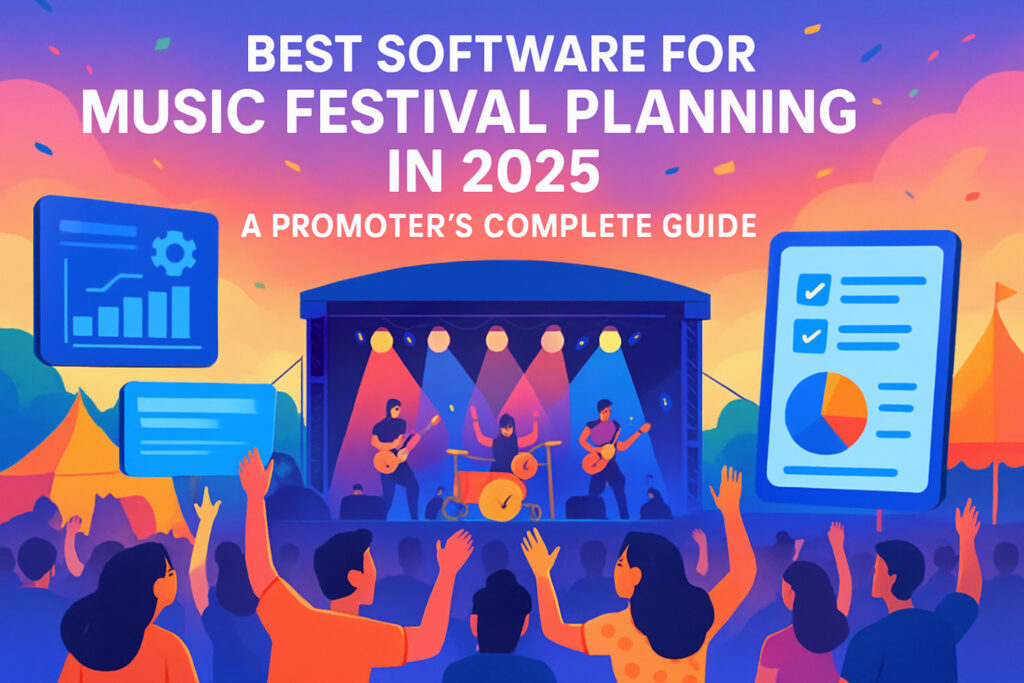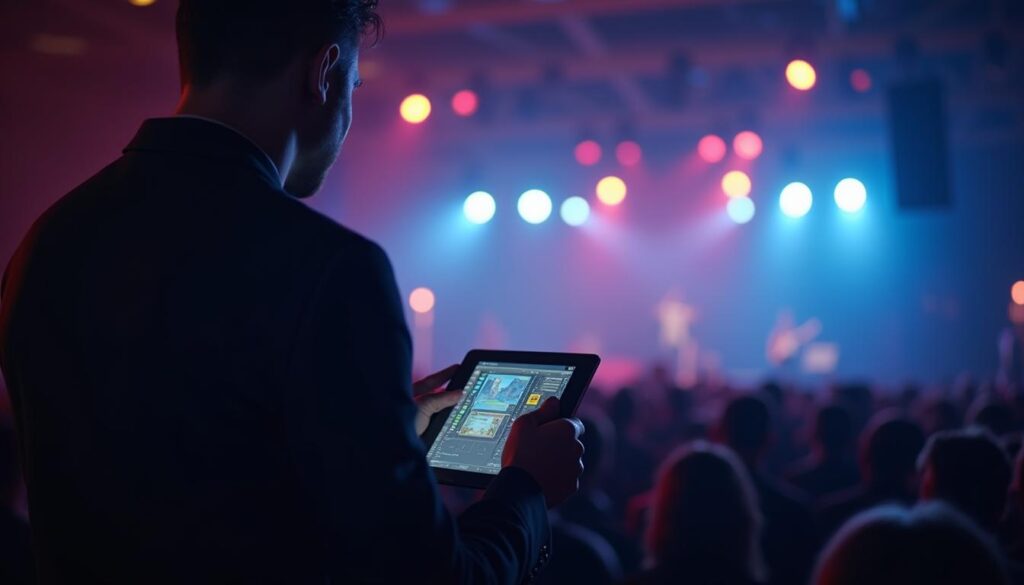
Theater Planning Facilities for Performing Arts and Live Entertainment
Theater planning facilities for performing arts and live entertainment are entering a new era, and the old way of doing things isn’t cutting it. Legacy systems, outdated spreadsheets, and scattered communication kill productivity and blow budgets. For performing arts venues juggling dozens of shows, rentals, and programs, real-time collaboration across the entire team is a requirement.
From booking to settlement and seat reservations to online ticket sales, managing a space built for entertainment demands software that’s built to handle the pressure. Theater management software is specifically designed for live events and tailored for the unique functions of every room, screen, or house. You need tools that enhance customer experience while giving staff cutting-edge technology to streamline operations and pull valuable insights from every performance.
With mobile devices in everyone’s hands and pressure to generate revenue from every corner of the building, theater planning software must support seamless scheduling, real-time data access, and top-tier security. The venues that win are the ones that stop juggling and start running like a system.
Why Theater Planning Facilities for Performing Arts Are the Backbone of Live Entertainment
Unlike general event spaces, theaters come with their own set of constraints, such as limited seat counts, rigid scheduling windows, acoustics, lighting requirements, artist contracts, and union crew rules. Most venues are running multiple programs at once: in-house productions, one-off rentals, touring acts, community events, and private functions. That’s a lot of moving parts in a single building, often with overlapping timelines and shared resources.
The complexity compounds when you factor in the number of people involved. Production managers, technical directors, booking agents, marketing teams, and front-of-house staff all need access to the same information, at the same time, with zero room for error. Without a centralized system, critical details get lost in email chains or scribbled on post-its. When your screen goes dark, it’s not just inconvenient; it’s expensive. That’s why smart theater planning isn’t optional anymore. It’s survival.
Modern Theater Facility Management Requires More Than Spreadsheets
Running a modern theater with outdated tools is like trying to stage Hamlet with a busted spotlight—technically possible but a total mess. When you’re managing a calendar full of performances, rentals, and rehearsals, you can’t afford slow systems and disconnected data. Theater planning facilities for performing arts and live entertainment need fast, flexible tools that can handle the pace and complexity of real live entertainment.
The Hidden Cost of Manual Workflows and Fragmented Tools
Spreadsheets don’t scale. They break under pressure, especially when your team is scrambling to update schedules, manage budgets, and confirm artist logistics across multiple productions. Fragmented systems lead to version control nightmares and missed details that tank shows. Every manual entry is another opportunity for something to slip.
Why Mobile Device Access and Centralized Data Matter
Live entertainment doesn’t live at a desk. Theater teams are on the move, checking lighting cues, coordinating load-ins, or updating schedules from the wings. With access to centralized data on mobile devices, every person involved can stay connected in real time. No more chasing down answers. Everyone sees the same version of the truth, instantly.
Real-Time Alignment Is Non-Negotiable
From booking a space to settling a show, timing is everything. If your ticket sales, budget projections, and event logistics live in separate places, your operation is bleeding time and money. Real-time alignment means fewer mistakes, faster decisions, and a team that’s not constantly putting out fires.
Theater Management Software Features That Take Planning to the Next Level
To survive in a world of shrinking margins and growing expectations, theater facilities need systems built for high-stakes, high-velocity performance. The right features can transform how your team operates, from the first inquiry to the final curtain call.
Smart Calendars Tailored for Stage Scheduling and Space Use
Generic calendars don’t cut it. You need tools that can handle overlapping shows, rehearsals, tech days, and rentals—all color-coded and filterable by room, stage, or screen. A smart calendar built for theaters keeps your programs organized and your staff two steps ahead.
Streamlined Offer-to-Settlement Workflows
Booking a show should never feel like a game of telephone. From initial offer to final settlement, a single system should manage contracts, deposits, expenses, and payouts. When your offer, budget, and actuals live in the same ecosystem, your team gets clarity, and your bottom line gets protection.
Financial Transparency and Planning for Performance-Based Income
Theater planning facilities for performing arts and live entertainment need both ticket sales data and performance insights. With real-time financial reporting and forecasting, your team can track revenue, expenses, and profitability across shows and seasons. That level of transparency drives smarter programming.
Custom Roles and Permissions for Multi-Department Collaboration
Your lighting tech doesn’t need access to artist payouts, and your box office manager doesn’t need to edit production schedules. With customizable permissions, every team member sees exactly what they need—no more, no less. That keeps your operation secure, lean, and laser-focused.
Theater Teams That Win Are the Ones That Plan Together
A well-run theater features flawless execution behind the scenes. That only happens when everyone from production to box office is aligned and working off the same playbook. Effective planning prevents mistakes and builds a system that scales.
Shared Holds, Integrated Calendars, and Easy Communication
No more overlapping holds or double bookings. With shared calendars and integrated hold systems, your team and partners can see real-time availability. Integrations reduce back-and-forth messaging and speed up confirmations. Everyone knows who’s got what and when—it’s all in one view.
Keeping Internal Staff and External Partners Synced
Theater operations don’t stop at the building. You’ve got vendors, promoters, and guest companies all needing access to critical info. A centralized system ensures external collaborators can get what they need without slowing your team down or creating unnecessary risk.
Templates, Tasks, and Repeatable Systems that Scale
High-performance theaters rely on repeatable processes. Task templates, auto-assigned workflows, and built-in reminders mean no detail slips through the cracks. You build a machine that keeps doing the job better, show after show.
Data-Driven Decisions That Make or Break a Theater Season
Gut feelings don’t always lead to a profitable season. With tighter budgets and more competition, every decision—what show to book, how to price it, when to promote—needs to be backed by real data. Theaters that understand their numbers are the ones that stay standing.
Forecasting Box Office Performance With Past Show Data
Historical ticket sales are roadmaps. Use analytics to see which artists, genres, or productions delivered results and when. Make booking decisions based on performance trends, not guesswork. Want to know the best time to slot a jazz series or how a touring act did in similar markets? Dig into past show data to project revenue, set realistic ticket goals, and avoid flops before they happen.
Evaluating Artist Performance by Region and Genre
Booking decisions shouldn’t happen in a vacuum. See how specific acts perform across different cities or within niche genres. Whether you’re filling a mainstage or testing out a black box series, you’ll have the data to back your call.
Building Smarter Co-Pro and Rental Strategies Based on Trends
Not every show needs to be yours alone. Use performance data to negotiate better co-productions or structure rentals that generate revenue with less risk. When you know what works and what doesn’t, you turn your venue into a high-functioning business, not just a space.
Data also reveals what your audience actually responds to, helping you curate shows that resonate and enhance the fan experience. Whether it’s optimizing the schedule, pricing, or even concessions, the right insights let you plan with both your wallet and your patrons in mind. Theater planning facilities for performing arts and live entertainment depend on this level of intelligence to stay competitive and keep seats filled.
Bring Efficiency Center Stage With Theater Planning Software
Planning performances shouldn’t feel like a juggling act with spreadsheets and outdated tools. Theaters face tighter margins, more competition, and sky-high expectations from both artists and audiences. To keep pace, you need systems that eliminate chaos, tighten communication, and turn real-time data into smart decisions. Theaters that embrace modern, streamlined operations discover how to thrive.
At Prism, we’ve built theater planning software that gives your entire team the tools to manage events from first hold to final settlement, all in one place. From cinema management software to live music planning, our platform is specifically designed for performing arts venues, with powerful features for scheduling, financial tracking, offer generation, and real-time collaboration. We help you streamline operations, boost productivity, and make decisions that drive revenue. Get started today to stop scrambling and start scaling.

Matt Ford is the founder and CEO of Prism.fm, an Austin-based software company revolutionizing live music event management. With a background in entrepreneurship and a degree from the University of Wisconsin-Madison School of Business, Ford combined his self-taught coding skills with firsthand experience as a concert promoter to address the inefficiencies he observed in the industry. In 2018, he launched Prism.fm, an all-in-one platform designed to streamline operations for venues, promoters, and agencies by replacing cumbersome spreadsheets with integrated tools for booking, financial tracking, and contract management. Under his leadership, Prism.fm has grown significantly, achieving $3 million in annual recurring revenue post-COVID and securing over $15 million in funding . Ford’s commitment to building user-centric solutions has positioned Prism.fm as a trusted partner for over 1,500 venues and promoters worldwide.



